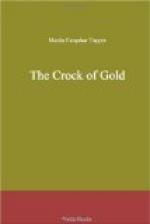Irishman’s illimitable rope, with the end cut
off. So while Roger was brewing up vast schemes
of nascent wealth, and prosperous days at last, the
filched sovereign, attracted by centripetal gravity,
had found a passage downwards, and had straightway
rolled into a crevice of mother-earth, long before
its “brief lord” had commenced his day’s
labour. Yes, it had been lost a good hour ere
he found it out, for he had fancied that he had felt
it there, and often did he feel, but his fancy was
a button; and when he made the dread discovery, what
a sting of momentary anguish, what a sickening fear,
what an eager search! and, as the grim truth became
more evident, that, indeed, beyond all remedy, his
new-got, ill-got, egg of coming wealth was all clean
gone—oh! this was worm-wood, this was bitter
as gall, and the strong man well-nigh fainted.
It was something sad to have done the ill—but
misery to have done it all for nothing: the sin
was not altogether pleasant to his taste, but it was
aloe itself to lose the reward. And when, pale
and sick, leaning on his spade, he came to his old
strength again, what was the reaction? Compunction
at incipient crime, and gratitude to find its punishment
so mercifully speedy, so lenient, so discriminative?
I fear that if ever he had these thoughts at all, he
chased them wilfully away: his disappointment,
far from being softened into patience, was sharpened
to a feeling of revenge at fate; and all his hope
now was—such another chance, gold, more
gold, never mind how; more gold, he burnt for gold,
he lusted after gold!
We must leave him for a time to his toil and his reflections,
and touch another topic of our theme.
CHAPTER V.
The inquest.
Just a week before the baronet came of age, and
a fortnight from the present time, an awful and mysterious
event had happened at the Hall: the old house-keeper,
Mrs. Quarles, had been found dead in her bed, under
circumstances, to say the very least, of a black and
suspicious appearance. The county coroner had
got a jury of the neighbours impanelled together;
who, after sitting patiently on the inquest, and hearing,
as well as seeing, the following evidence, could arrive
at no verdict more specific than the obvious fact,
that the poor old creature had been “found dead.”
The great question lay between apoplexy and murder;
and the evidence tended to a well-matched conflict
of opinions.
First, there lay the body, quietly in bed, tucked
in tidily and undisturbed, with no marks of struggling,
none whatever—the clothes lay smooth, and
the chamber orderly: yet the corpse’s face
was of a purple hue, the tongue swollen, the eyes
starting from their sockets: it might, indeed,
possibly have been an apoplectic seizure, which took
her in her sleep, and killed her as she lay; but
that the gripe of clutching fingers had left their
livid seals upon the throat, and countenanced the
dreadful thought of strangulation!




